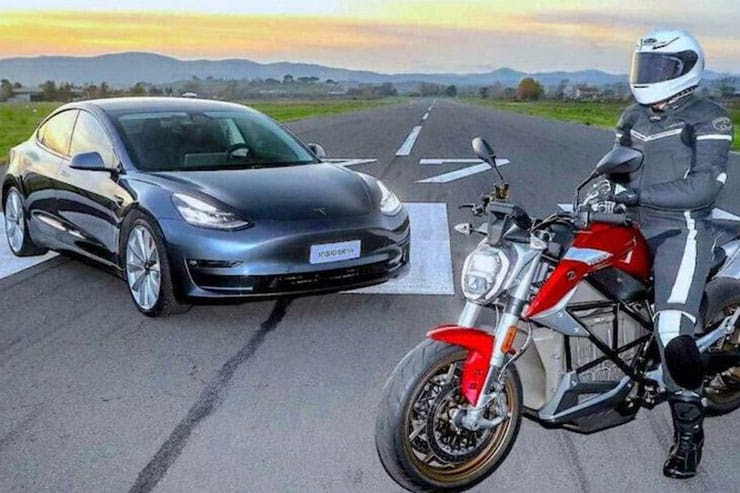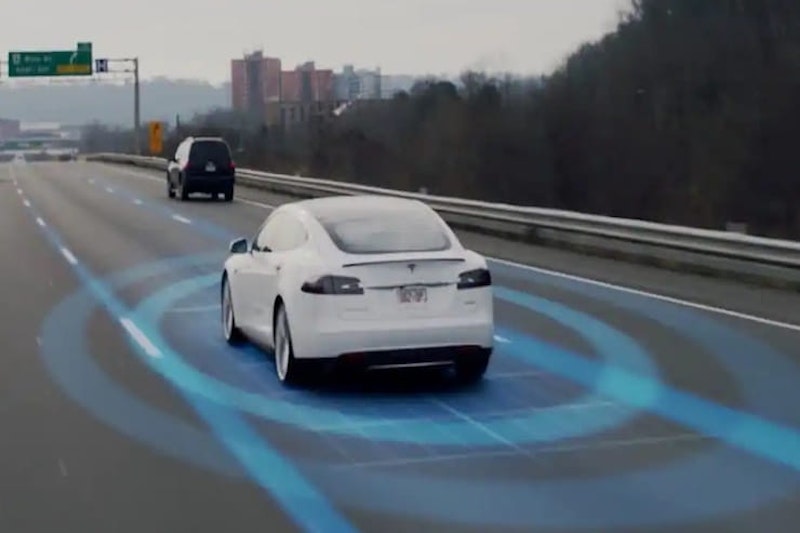FEMA blasts Tesla safety grading: 'Autopilot still kills motorcyclists'
Content and Features Writer
30.09.2022
The Federation of European Motorcyclists' Association (FEMA) has published an open letter criticising the decision by EuroNCAP to award the Tesla Model Y car a maximum five-star safety rating despite the availability of a feature deemed responsible for a number of fatal motorcycle collisions.
Titled 'Autopilot Still Kills Motorcyclists, the letter - posted to FEMA's website - lashes out at EuroNCAP's apparent move to disregard the safety implications of Tesla's optional extra 'Autopilot' feature on other road users despite it being ruled as the primary contributing factor to accidents involving motorcyclists.
EuroNCAP - The European New Car Assessment Programme - is an independent and well-known industry-standard body that rates each new car on sale for occupant, road user and hazard safety via a series of controlled assessments.
It breaks its ratings down into four key areas of safety - Adult Occupant, Child Occupant (car seat), Vulnerable Road Users, such as pedestrians, and Safety Assist features - with a percentage ranking awarded for each. It is then translated into a simple five-star rating overall.
Earlier this month, EuroNCAP tested the latest Tesla Model Y SUV - which is available alongside the Tesla Model S, Tesla Model 3 and Tesla Model X - and gave it a maximum five-star rating overall.
However, at the heart of FEMA's complaint is the decision to award the Model Y a 98% rating for 'Safety Assist', despite controversy centred around its pay-walled 'Autopilot' option, though it should be noted the model tested was equipped and measured with only factory 'standard features'.
What is Tesla 'Autopilot'?
Autopilot offers a degree of autonomy to in effect allow the car to drive itself.
Once engaged by the driver, Autopilot - a £6,800 optional extra on the Model Y for full 'self-driving' mode - propels forward, brake and steer without driver input based on sensors monitoring the surroundings and reacting in the event of a potential hazard.
More advanced than a number of similar safety options offered by rival manufacturers - such as lane assist, brake assist and alerts - the Autopilot system however stops short of full self-driving autonomy with Tesla insisting it should only be engaged provided the driver is able to assume full control instantly at any moment.
Despite this, Autopilot has courted controversy around the world amid concerns not enough testing has been completed to safeguard motorcyclists following a number of high-profile incidents. These include two separate incidents in the United States that led to the death of two motorcyclists in accidents that involved a Tesla.
Key to the complaints are a concern that Autopilot is not sophisticated enough to detect smaller, fast-moving and agile objects, such as motorcycles.
With this in mind, FEMA has skewered the influential EuroNCAP - whose ratings are often prominently highlighted during promotions - for not taking the opportunity to put pressure on Tesla and other manufacturers to initiate changes or disable the function while more testing is completed.
The full open letter from FEMA reads:
"Euro NCAP stars do not protect motorcyclists. FEMA considers this an unacceptable situation and sent a letter to Euro NCAP to alert them to this unsafe situation, caused by their own testing methods. Euro NCAP denies their tests are inadequate. (EuroNCAP's response included at bottom of article)
"In September 2022, Euro NCAP, a voluntary vehicle safety rating system, rated the Tesla model Y with 5 stars . This is not unusual for a modern car. These five stars are partially based on a very high rating for 'Safety Assist', 98%, which is almost as high as you can get. We consider this very high rating remarkable at least.
"Since Tesla cars hit the roads with their 'Autopilot' system, there are reports of remarkable and unexplainable accidents with Tesla cars that can be linked to the driver assist systems. Even this year, in July 2022, two motorcyclists were killed in the USA in crashes that were caused with, or should we say 'by', Tesla cars. In both situations, the motorcycles, riding in the dark, were not recognized by the Tesla safety assist systems and by the drivers who seemed to rely too much on the safety systems in their Tesla (watch the video below this article for a full explanation).
"For years now, experts point out that the Tesla assist systems have one big shortage. They are entirely based on camera sensors. All other car manufacturers use a combination of camera and radar or lidar, but Elon Musk has always made clear that in his view camera sensors are enough.
"Even when many Teslas crashed in the past six years due to failing safety systems, Musk sees no need to change that. The issue with cameras is that – contrary to radar and lidar – they have only a limited capacity to estimate distance. In the case of the two killed motorcyclists mentioned above, they rode on cruiser-type motorcycles with very low taillights.
"Since the cameras could only detect the taillights and not the rest of the motorcycle and the riders themselves, the safety system estimated their distance wrong, which caused the crashes. In other situations, Tesla safety systems did not recognize emergency vehicles that were parked on the border of a motorway, a motorcycle policeman, waiting for a traffic light, etcetera. The point is: the Tesla safety assist systems have proven themselves to be inadequate and unreliable.
"Now back to the Euro NCAP star rating. The safety systems of the cars are tested in several situations. Mostly with cars, but some tests are also performed with dummy cyclists and pedestrians. A few tests are performed in the dark. No tests are performed with motorcyclists yet. The AEB tests were performed with cars, pedestrians, and cyclists.
"The tested Tesla model Y that got the five-star rating in September 2022 had only camera sensors, which worked well under these circumstances. It was tested in two situations with pedestrians in the dark, and that worked well too.
"But the crashes in July 2022 show that the Tesla camera sensor has problems with recognizing motorcyclists (and possibly also cyclists) in the dark, because it seems to confuse them with further ahead driving cars. Euro NCAP does not test this common situation where a car nears a motorcycle from behind.
"What you do not test cannot fail, and this way the Tesla model Y gets 5 stars awarded, but that does not make it a safe car, although the buyer may believe otherwise.
From the beginning of the arrival of cars with safety systems we have lobbied for the inclusion of motorcyclists in the tests. This started in 2016 with the crash of a Tesla car with a young motorcyclist in Norway.
"Slowly we are getting somewhere, but this high rating of the Tesla model Y shows that we are not there yet. We sent a letter to EuroNCAP to alert them to this unsafe situation, caused by their own testing methods. We also told them that we consider this an unacceptable situation."
What was EuroNCAP's response to FEMA?
In response to FEMA's approach, EuroNCAP responded that it currently isn't legally obliged to integrate such features into its controlled testing methods but is prepared to do so in future.
"Euro NCAP is continuing to improve protocols and has invested a lot time and efforts to develop test procedures including PTW (powered two-wheelers, ed.). These will become part of the rating next year. Euro NCAP already is far beyond what is legally required, but with this update will push the vehicle manufacturers even more to improve their systems.
"Tesla has performed very well in the tests we currently conduct and deserves credit for it, not questioned. Is it optimised to the test? Maybe, but so are others."
FEMA's words come at a time when the four-wheel industry pushes ahead with development of fully autonomous cars.
A number of high-profile manufacturers are in the process of rigorously testing so-called 'self-driving cars' with support from a number of tech and transport companies, such as Apple, Google and Uber.
Share on social media:

